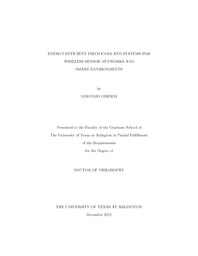| dc.description.abstract | In a wireless sensor network, small computing devices, called sensors, sense the surrounding environment and relay the sensed data to a base station over a multi-hop wireless network, eventually processing them en-route. Wireless sensor networks and other devices, such as smartphones, smart meters, and smart appliances, cooperate in smart environments to obtain information about the environment, and then use this information to improve the experience of the users. Since most of these systems rely on battery power, there is a need for energy-efficient solutions for their operation. The objective of this dissertation is to design algorithms and protocols to improve the energy efficiency of such systems, and validate them using mathematical analysis, software simulations, and testbed experiments.In the first part of the dissertation, we look at two fundamental problems in wireless sensor networks: localization and duty cycling. In the area of localization, we describe a novel protocol for duty cycling wireless actor and sensor networks, and present a mathematical analysis based on the coupon collector's problem and the theory of coverage processes, as well as simulation results. Our analysis and results show that the proposed protocol achieves the user-requested localization accuracy while maximizing the sleep time of sensor nodes. As far as duty cycling is concerned, we present novel Markov chain-based randomized schemes, and discuss the probabilistic analysis, as well as the experiments we conducted on Sun SPOT sensors. These results show that our proposed schemes reduce the sleep latency, while not affecting other performance metrics such as the energy efficiency, or vice versa.In the second part of the dissertation, we shift our focus to smart environments, and present our research work on data fusion and visualization aimed to provide lay users with actionable information. We introduce a framework, called FuseViz, to leverage already existing data sources such as smartphones, online databases and services, and wireless sensor networks, while addressing the challenges posed by large, live, heterogeneous, and autonomous data streams. We demonstrate the concepts behind our framework with a case study in building energy efficiency, and introduce E2Home, a Web-based application for this problem developed on top of the framework. Preliminary experiment results for the proposed E2Home system not only show that the actionable information can be easily computed, but also demonstrate energy savings of about 10%. Finally, we conclude our dissertation with an overview of a system-level energy model, built using data from the above-mentioned sources, that can be tailored for each home, its location, and residents, and can help further minimize energy consumption. | en_US |


